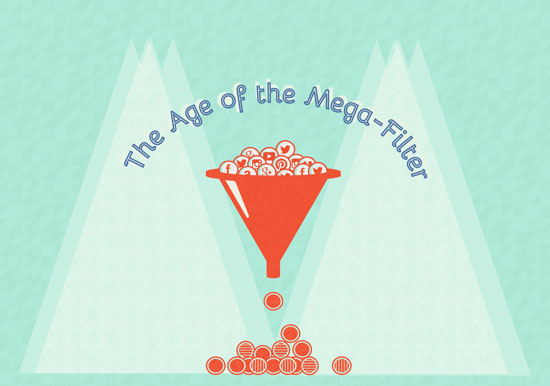I have seen the future and it is ZIte-like.
Zite is the best utility I have seen so far to actually “learn” what content I enjoy. It customizes an evolving delivery system based on what it is learning about me. The more I use it, the better it gets.
In fact, it is doing such a good job delivering intensely amazing content it has become addictive. I’ve already abandoned many other sources of online news and insight.
But this is not an ad for Zite, which is just one of many innovations we will see to help us navigate through our information-dense world. Today, I wanted to have us think through together the marketing implications of a new wave of radical content filters.
ZEO?
Five years ago when you or I did a search on Google for the best deal on an automobile or a review of a new car model, we would get similar results … probably the same results. But over time, Google has made its search results highly-tailored to your environment. Where are you? Who are you? Who are your friends? This has resulted in an ever-tightening bubble of personalized results. The results you would get today are almost certainly different than what I would get.
Zite is an even more extreme example of this as it actually pushes content to you and only you, constricting the scope of possible content that you see.
Let’s say you are trying to create content about automobiles that will be organically discovered by a high-potential customer like me. To get through this filter, you won’t just have to somehow push it to the top of Google, you may also have to get it through the Zite algorithm … and all the Zite competitors crowding into this increasingly important space.
Will that require different strategies? Perhaps we won’t just be concerned with SEO. We might also need to consider Zite Engine Optimization? : )
Let’s twist this one more time. Zite is owned by the American news network CNN. What are the commercial implications of that? Maybe we won’t be working on backlinks to please Google. Perhaps content marketing of the future will include advertising with parent companies so our content gets preferential treatment in its filters?
Settling into same-dom
This new era of mega-filters will also present a challenge to any organization or brand trying to introduce a new idea or product. Today when I read an online newspaper or news feed, I am also presented with many alternative content choices. This content might be way out of my normal comfort zone but interesting to me nonetheless. I like reading about new things. I mean, how else would I learn about twerking?
But as information density increases in my busy world, I could definitely see a day when I spend almost all my time with my own personalized filter. I would rarely see things outside my comfort zone because keeping me IN my comfort zone is exactly what these filters are trying to do! If Zite figures out I’m politically liberal, it is probably not going to offer an editorial with a conservative viewpoint. That would be a Filter Fail.
Every online organization is collecting data about us and determining what we are going to view and hear based on the stereotype they are creating for us.
While there are obvious benefits to this, the diversity of my content stream is also being strangled by every search and social media platform into same-dom. Interesting implications for how we learn and discover (or not discover) new ideas, no?
Providing fuel, not content
Let’s push this idea of radical filtering to an even higher level.
Siri presents a particularly interesting type of content filter and a plucky problem for marketers. If you ask Siri a question, you might get a verbal answer, not necessarily a list of attributed, optimized content (and ads) to choose from.
I recently had a chance to see where this kind of precise search is heading when I met some people who work with Watson, IBM’s amazing cognitive computing technology. This might be the ultimate filter because it is not just tailoring CONTENT for you, it’s tailoring one precise ANSWER for you, even if is highly complex. It can process billions of bits of content and solve even the most difficult query in a heartbeat.
When I asked a Watson team member about the importance of content to this breakthrough technology, she paused and said, “It’s not just content to us, it’s fuel.”
Isn’t that interesting? What are the implications for content marketing when we’re tasked to provide computer fuel instead of merely blog posts and YouTube videos? Will visual and video content even “count” in that kind of environment?
In less than 18 months, IBM developers reduced the size of the first Watson computer from “a bedroom to the size of three pizza boxes.” And at the same time, they increased the speed by 24X! Is there any doubt that in the foreseeable future we will be carrying this power in our pocket or wearing it on our wrist?
Adjusting content strategies to a cognitive computing environment will be here soon. This will certainly hasten the demise of marginal content producers and up the game for good ones as precision content becomes a highly-prized resource.
Are you thinking about this now?
In my recent Content Shock article defining the problem of becoming the signal in a world that is insanely dense with information noise, I ended with an open-ended question. What next?
Certainly, this new wave of radical filters is a development worth considering. If you are still of the mindset that Google is the only barrier between your content and a buying customer, think again. It’s getting a lot more interesting.
Radical personal filtering. A strangulation of the content stream. Content as fuel. Discuss, won’t you?
Original illustration copyright www.businessesGROW.com
Disclosure: IBM is a client.



